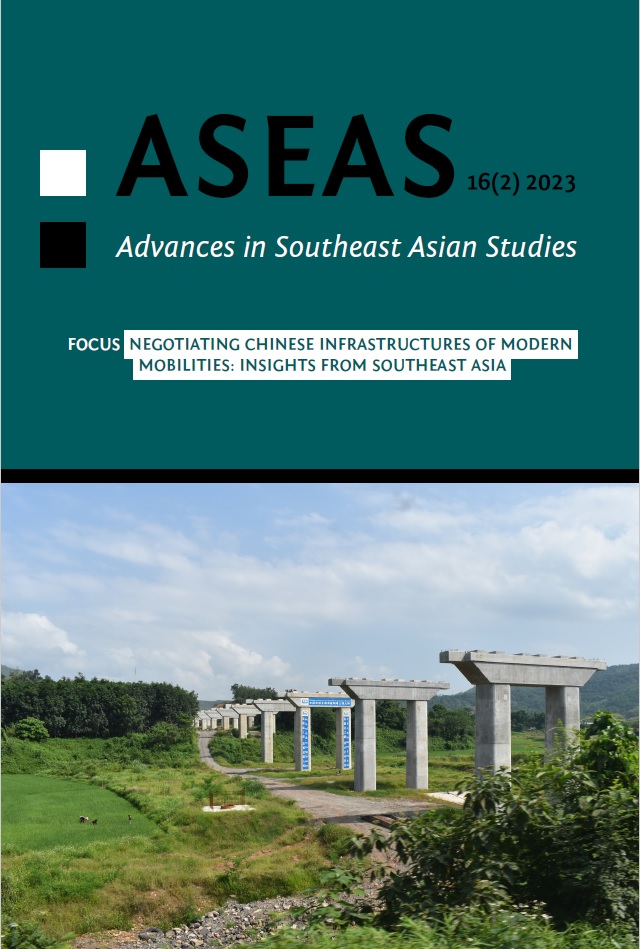Infrastructural Fragility, Infra-Politics and Jianghu
DOI:
https://doi.org/10.14764/10.ASEAS-0102Keywords:
China, Human Impact, Infra-Politics, Infrastructural Fragility, Jianghu AlteritiesAbstract
This commentary responds to Tim Oakes' analysis of infrastructural power by examining the inherent fragility of mobility infrastructures and their political ramifications. It emphasizes the human element in creating and maintaining these infrastructures, highlighting the intricate interplay of political will, bureaucratic planning, technological know-how, and specialized skills needed for their implementation. The paper contends that the COVID-19 pandemic has starkly demonstrated the vulnerability of mobility infrastructures to rapid collapse. It further explores the concept of infra-politics, referring to subtle acts of resistance within these networks, which significantly disrupt their efficient operation. The Chinese concept of jianghu, representing a metaphorical space of alterity, is introduced to propose that infra-politics might evolve into alternative relational forms, challenging and potentially subverting the dominance of centralized networks.
References
Carse, A., & Kneas, D. (2019). Unbuilt and unfinished: The temporalities of infrastructure. Environment and Society: Advances in Research, 10, 9-28.
Coates, J. (2020). The Ikebukuro Jianghu. Fictions, Fieldsights, October 28. https://culanth.org/fieldsights/the-ikebukuro-jianghu
Graeber, D. (2013). It is value that brings universes into being. HAU: Journal of Ethnographic Theory, 3(2), 219-243.
Harney, S., & Moten, F. (2013). The undercommons: Fugitive planning & black study. Minor Compositions.
Ley, L., & Krause, F. (2019). Ethnographic conversations with Wittfogel’s ghost: An introduction. Environment and Planning C: Politics and Space, 37(7), 1151-1160.
Scott, J. C. (1990). Domination and the arts of resistance: Hidden transcripts. Yale University Press.
Tsing, A. L. (2005). Friction: An ethnography of global connection. Princeton University Press.
Wang, F., & Wang, Y. (2021). The buzzwords reflecting the frustration of China’s young generation. https://www.bbc.com/news/world-asia-china-57328508
Wittfogel, K. A. (1957). Oriental despotism. A comparative study of total power. Yale University Press.
Yurchak, A. (2005). Everything seemed forever until it was no more: The last Soviet generation. Princeton University Press.
Downloads
Published
Issue
Section
License
Copyright (c) 2023 Susanne Brandtstädter

This work is licensed under a Creative Commons Attribution-NonCommercial-NoDerivatives 4.0 International License.
For all articles published in ASEAS before December 2014 and after July 2022, copyright is retained by the authors. For articles published between January 2015 and June 2022, the Society for South-East Asian Studies (SEAS) is the copyright holder. Articles published in ASEAS before December 2019 are licensed under the following Creative Commons License: Attribution-NonCommercial-NoDerivs 3.0 Unported. Articles published after that date are licensed under the following Creative Commons License: Attribution-NonCommercial-NoDerivs 4.0 International. In both cases, this means that everybody is free to share (to copy, to distribute, and to transmit the work) under the following conditions:
-
Attribution — You must give appropriate credit, provide a link to the license, and indicate if changes were made. You may do so in any reasonable manner, but not in any way that suggests the licensor endorses you or your use.
-
NonCommercial — You may not use the material for commercial purposes.
-
NoDerivatives — If you remix, transform, or build upon the material, you may not distribute the modified material.


